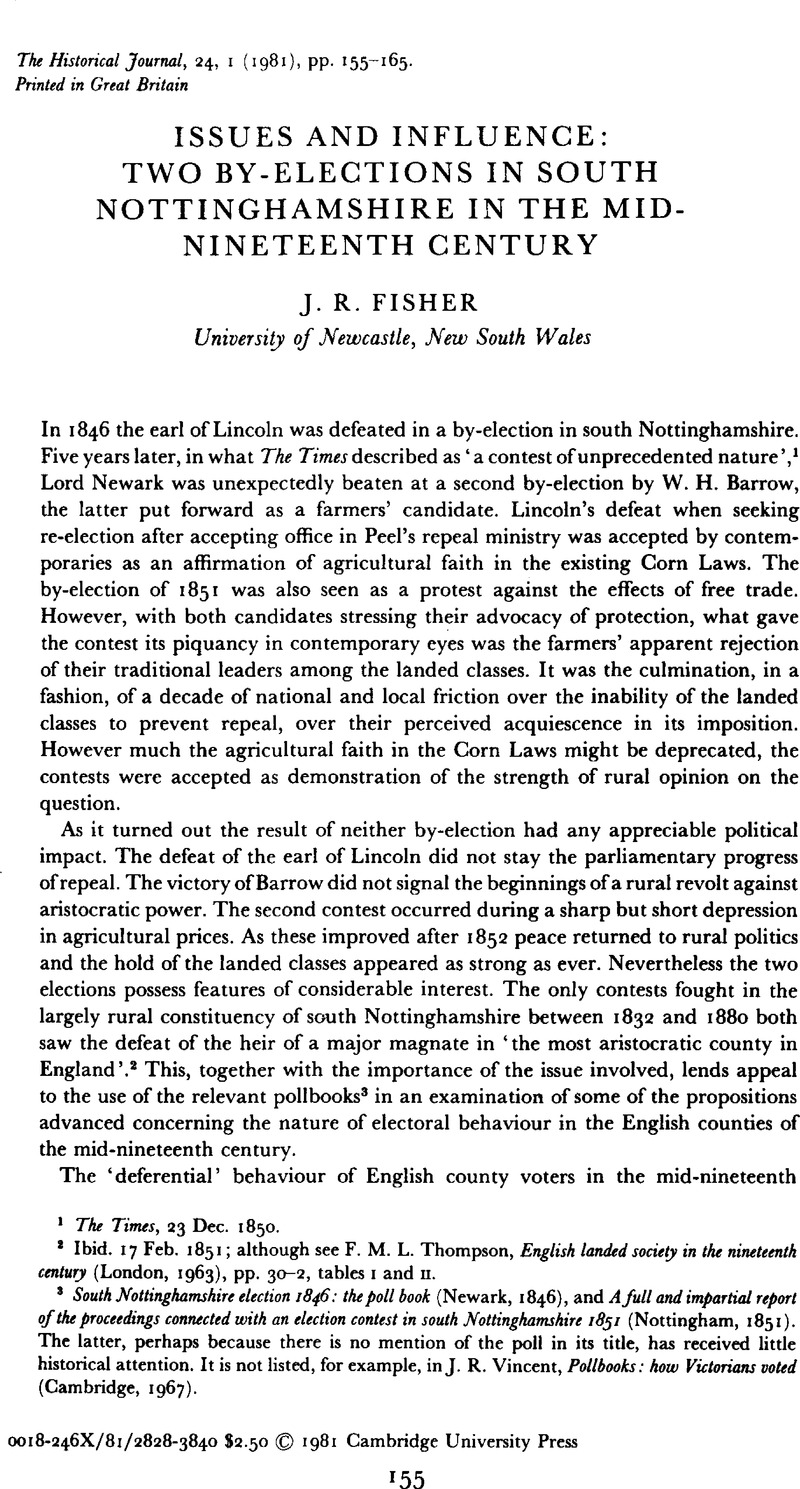Article contents
Issues and Influence: two by-elections in South Nottinghamshire in the mid-nineteenth century
Published online by Cambridge University Press: 11 February 2009
Abstract

- Type
- Communications
- Information
- Copyright
- Copyright © Cambridge University Press 1981
References
1 The Times, 23 Dec. 1850.
2 Ibid. 17 Feb. 1851; although see Thompson, F. M. L., English landed society in the nineteenth century (London, 1963), pp. 30–2, tables I and II.Google Scholar
3 South Nottinghamshire election 1846: the poll book (Newark, 1846)Google Scholar, and A full and impartial report of the proceedings connected with an election contest in south Nottinghamshire 1851 (Nottingham, 1851)Google Scholar. The latter, perhaps because there is no mention of the poll in its title, has received little historical attention. It is not listed, for example, in Vincent, J. R., Pollbooks: how Victorians voted (Cambridge, 1967).Google Scholar
4 Moore, D. C., The politics of deference: a study of the mid-nineteenth century English political system (London, 1976), p. 10.Google Scholar
5 Ibid. p. 326.
6 Ibid. pp. 7–8.
7 Primarily county directories. The two used here are Lascelles' and Hogar's commercial directory of the county and of the town and county of Nottingham (Nottingham, 1848)Google Scholar and White's directory of Nottinghamshire 1853 (1853).Google Scholar
8 Fraser, D., ‘Nottingham and the Corn Laws’, Transactions of the Thornton Society, LXX (1966), 81–103.Google Scholar
9 The most recent include Stewart, R., The politics of protection (Cambridge, 1971)Google Scholar, Olney, R. J., Lincolnshire politics 1832–1885Google Scholar and Crosby, T. L., English farmers and the politics of protection 1815–1852 (London, 1977).Google Scholar
10 Bell's Weekly Messenger, 29 Jan., 11 and 25 March 1844.
11 Stewart, R., Politics of protection, pp. 56–8Google Scholar; Mary, Tancred-Lawson, ‘The Anti-League and the Corn Law crisis of 1846’, Historical Journal, III (1960), 162–83.Google Scholar
12 The duke of Portland and Lord George Bentinck took a close interest in the contest, but their intervention appears to have been limited to encouraging the Central Protection Society to send Mr Croucher, an experienced election agent, to co-ordinate the local effort. Portland MSS, PwH 203–10.
13 Nottingham Review, 27 Feb. 1846.
14 See the Newcastle MSS, NeC 4575–4645 and 12103–118, for Lincoln's correspondence with local figures and with Sir Robert Peel on the course of his campaign. See the appendix for an estimate of his support among landowners as a whole.
15 Vincent, Pollbooks, p. 37.
16 Moore, Politics of deference, pp. 162–7.
17 The Times 6 March 1846.
18 Parliamentary papers, 1847, XLVI, 337Google Scholar. See also Prest, J., Politics in the age of Cobden (London, 1977), especially pp. 28–31.CrossRefGoogle Scholar
19 Nottingham Review, 21 Feb. 1851.
20 Bell's Weekly Messenger, 21 Feb. 1842.
21 The view is echoed in Crosby, English farmers, pp. 174–5.
22 See for example, Nottinghamshire Guardian, 19 and 26 Dec. 1850, for a discussion on ‘the introduction of the thumbscrew into South Nottinghamshire’.
23 The Times, 17 Feb. 1851.
24 Nottinghamshire Guardian, 7, 14 and 21 Nov. 1850.
25 Mingay, G. E., Enclosures and the small farmer in the age of the Industrial Revolution (London, 1968).CrossRefGoogle Scholar
26 P.P. LIII, 221.
27 See appendix.
28 Population figures from the Census of Great Britain I871, Population tables, II (1852).
29 This feature can be related both to the trend towards larger farms and the characteristics of ‘open’ and ‘closed’ parishes. See Holderness, B. A., ‘Open and close parishes in England in the eighteenth and nineteenth centuries’, Agricultural History Review, xx (1972), 126–39.Google Scholar
30 Nottingham Journal, 27 Dec. 1850.
31 Mark Lane Express, 18 June 1849. Also Select committee on bribery at elections, Qs 2763–75: P.P. 1835, VIII.
32 The Times, 17 Feb. 1851.
33 Nottingham Journal, 3 Jan. 1851. (The list of signatories to the Newark Farmers’ Club address provides no guide to preferences between the two candidates.)
34 See, for example, Hansard, CLXXXI (16 Feb. 1866), cols. 773–4.
35 I am grateful to Dr. R. Morgan of the Institute of Agricultural History for her helpful comments on an earlier draft of this paper.
- 1
- Cited by


